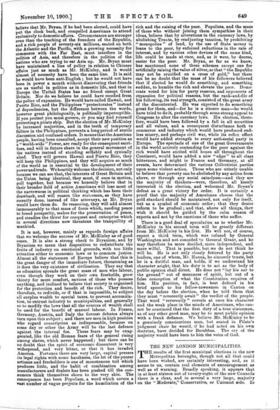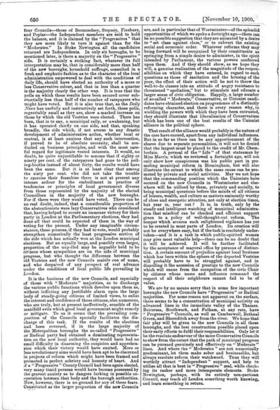THE NEW LONDON MUNICIPALITIES.
THE results of the first municipal elections in the new Metropolitan boroughs, though not all that could have been wished, are certainly interesting, and, as it seems to us, contain real elements of encouragement as well as of warning. Broadly speaking, it appears that in at least sixteen out of twenty-eight of the new Councils there is a clear, and in several a very large, majority on the " Moderate," Conservative, or Unionist side. In four Councils—those of Bermondsey, Stepney, Finsbury, and Poplar—the Independent members are said to hold the balance, and it is claimed by the " Progressives " that they are more likely to turn it against than for the " Moderates." In Stoke Newington all the candidates returned are Independents. In only six boroughs, to be mentioned later, is there a majority on the " Progressive " side. It is certainly a striking fact, whatever its full interpretation may be, that in considerably more than half of the new boroughs, household suffrage, consulted in a fresh and emphatic fashion as to the character of the local administration empowered to deal with the conditions of daily life, should have elected an authority of a more or less Conservative colour, and that in less than a quarter is the majority clearly the other way. It is true that the polls on which these results have been secured cover sub- stantially less than half of the number of ratepayers who might have voted. But it is also true that, as the Daily News has usefully and instructively set forth, these polls, regrettably small as they are, show a marked increase on those by which the old Vestries were elected. There has been, that is to say, a municipal rally, or awakening, but it has operated chiefly on one side, and that, speaking broadly, the side which, if not averse to any drastic development of administrative action, whether local or central, is at least anxious that any such intervention, if proved to be of absolute necessity, shall be con- ducted on business principles, and with the most care- ful regard for legitimate vested interests. It would, no doubt, be quite unjustifiable to assume that if eighty or ninety per cent. of the ratepayers had gone to the poll- ing-booths instead of about forty, the results would have been the same. But it is at least clear that among the sixty per cent. who did not take the trouble to exercise their franchise there is not at present any intense ardour for the embodiment in practice of tendencies or principles of local government diverse from those represented by the majority of the elected Councillors in the majority of the new boroughs. For if there were they would have voted. There can be no real doubt, indeed, that a considerable proportion of the abstentionists were lazy Conservatives who considered that, having helped to secure an immense victory for their party in London at the Parliamentary elections, they had done all that could be expected of them in the way of voting for the present. Under any imaginable circum- stances, these persons, if they had to vote, would probably strengthen numerically the least progressive section of the side which has actually won at the London municipal elections. But an equally large, and possibly even larger, proportion of the unpolled may be arguably held to be citizens whose sympathies are on the side of municipal progress, but who thought the difference between the old Vestries and the new Councils mainly one of name, and who despaired of any prospect of real advance under the conditions of local public life prevailing in London.
It is the business of the new Councils, and especially of those with " Moderate" majorities, so to discharge the various public functions which devolve upon them as, without inflicting any justifiable alarm upon the large body of steady-going citizens of limited views, to enlist the interest and confidence of those citizens, also numerous, who are truly, but at present ineffectively, sensible of the manifold evils which good local government might remedy or mitigate. To us it seems that the prevailing com- position of the Councils specially facilitates the dis- charge of this task. If the results of the elections bad been reversed, if in the large majority of the Metropolitan boroughs the so-called " Progressive" or Radical party bad obtained a dominating representa- tion on the new local authority, they would have had no small difficulty in disarming the suspicion and apprehen- sion which their victory would have excited. More or less revolutionary aims would have been apt to be discerned in projects of reform which might have been framed and promoted in perfect sobriety and honesty of heart. And if a " Progressive " County Council had been again elected, very many timid persons would have become possessed by the gravest anxiety as to dangers lurking in possible co- operation between that body and the borough authorities.
Now, however, there is no ground for any of these fears. Constituted as the larger proportion of the new Councils are, and in particular that of Westminster—of the splendid opportunities of which we spoke a fortnight ago—there can be no possible suggestion that they are animated by a desire to " set class against class," or to subvert the existing social and economic order. Whatever reforms they may bring forward will be recognised by their constituents as springing from a simple desire to administer, in the spirit intended by Parliament, the various powers conferred upon them. And if they should show, as we hope they will, a genuine realisation of the magnitude of the respon. sibilities on which they have entered, in regard to such questions as those of sanitation and the housing of the poor, the effect of their action will be not to throw the well-to-do classes into an attitude of angry resistance to threatened " spoliation," but to stimulate and educate a larger sense of civic obligation. Happily, a large number of so-called " Moderate," Conservative, or Unionist candi- dates have obtained election on programmes of a distinctly reforming character, and there is every reason why, in wielding the powers with which they have been entrusted, they should illustrate that liberalisation of Conservatism which has been one of the best results of the Unionist alliance in the political sphere.
That result of the alliance would probably in the nature of the case have ensued, apart from any individual influences. But in so far as there can be any apportionment of the shares due to separate personalities, it will not be denied that the largest must be placed to the credit of Mr. Cham- berlain. A perusal of the " Life " of that statesman by Miss Marris, which we reviewed a fortnight ago, will not only show how conspicuous was his public part in pro- moting municipal reform in Birmingham, but will also illustrate the extent to which the same cause can be pro- moted by private and social activities. May we not hope that the commanding position which the Unionists have secured on the new Councils in Westminster and else- where will be utilised by them, privately and socially, to bring municipal questions before the minds of all citizens of leisure, wealth, and culture as matters eminently worthy of close and energetic attention, not only at election times, but year in, year out ? It is, in truth, only by the steady and intelligent watching of municipal administra- tion that mischief can be checked and efficient support given to a policy of well-thought-out reform. The temper which secures such enlightened vigilance has yet to be created in most parts of London. Its creation will not be everywhere easy, but if the task is resolutely under- taken—and it is a task in which public-spirited women may give most valuable help—there can be no doubt that it will be achieved. It will be further facilitated by the acceptance of mayoral office by persons of distinc- tion. A. certain amount of prejudice against local business which has been within the sphere of the departed Vestries will probably have to be struggled against, and in dispelling it the accession of prestige to the new Councils which will ensue from the occupation of the civic Chair by citizens whose name and influence command the respect of all their neighbours cannot fail to be of value.
We are by no means sorry that in some few important boroughs the new Councils have "Progressive" or Radical majorities. For some reason not apparent on the surface, there seems to be a concentration of municipal activity on advanced lines in the immediate valley of the Thames. Battersea, Southwark, and Fulham, at any rate, have " Progressive" Councils, as well as Camberwell, Bethnal Green, and Shoreditch away from the river. We hope that fair play will be given to the new Councils in all these boroughs, and the best construction possible placed upon their early efforts to fulfil their responsibilities. Only let it be the resolute endeavour of the more Conservative Councils to show from the outset that the path of municipal progress can be pursued genuinely and effectively on " Moderate" lines. And where the " Moderates " are not numerically predominant, let them make sober and businesslike, but always resolute reform their watchword. Thus they will worthily attract " Independent " support, and help to utilise all that is best in " Progressive " zeal, while check. ing its rasher and more intemperate elements. Stoke Newington, perhaps, with its entirely non-partisan Council, may teach all London something worth knowing, and learn something in return.







































 Previous page
Previous page